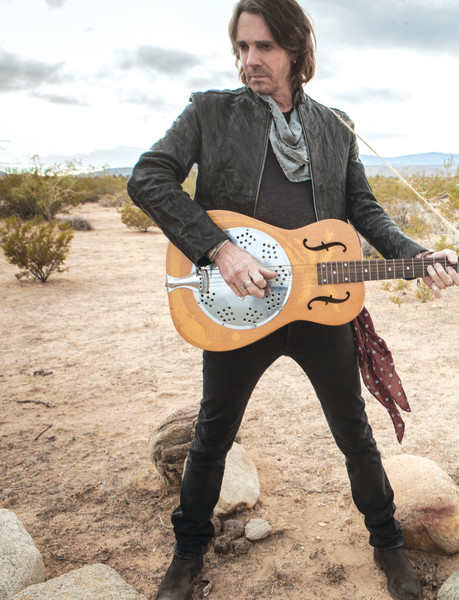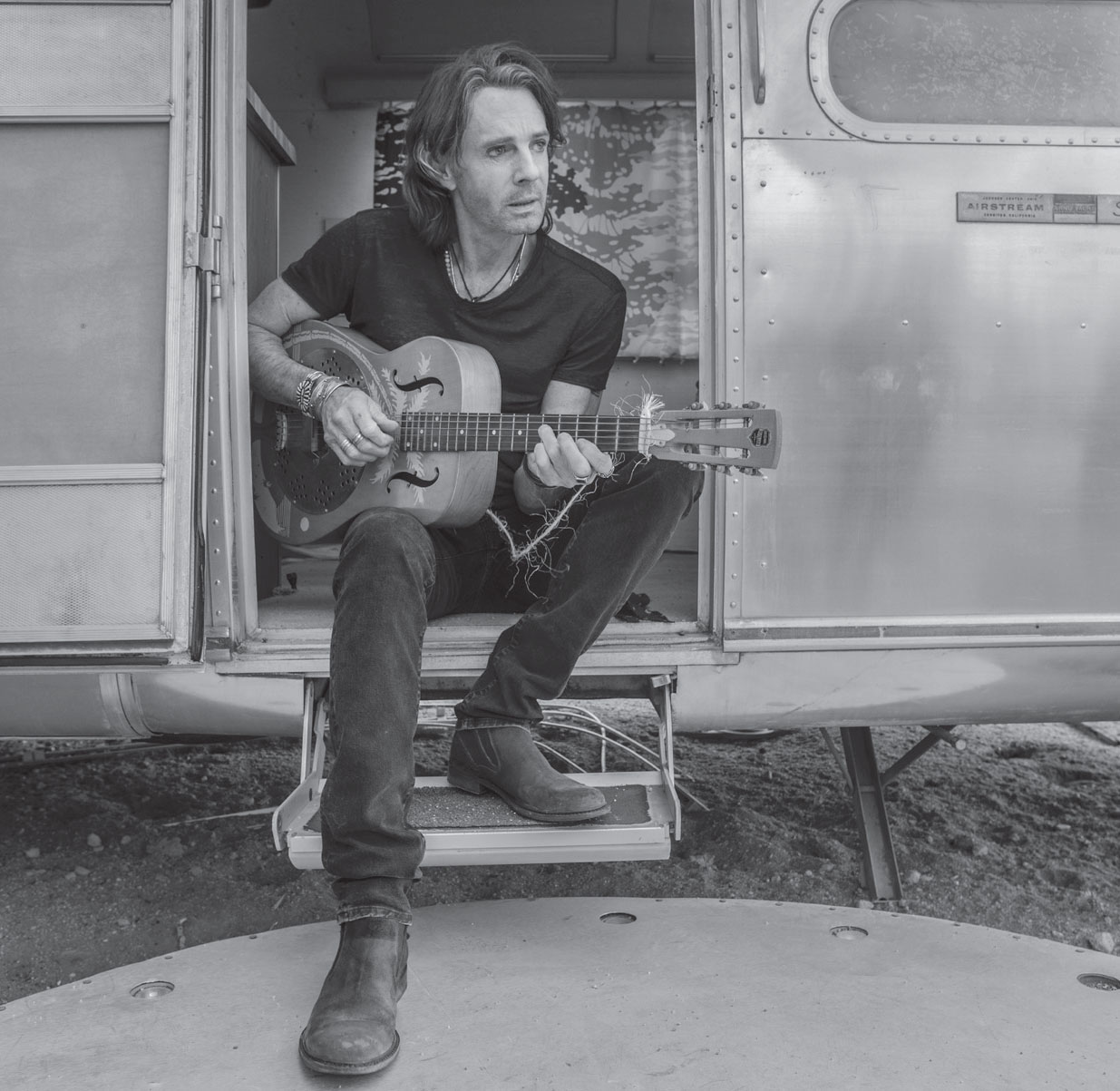Rick Springfield on Covering Katy Perry, the "Jessie's Girl" Strat and His Bluesy New Album, 'The Snake King'

He gave us "Jessie's Girl" and likes to channel Katy Perry in concert, but what Guitar World readers really want to know is...
Do you still have the White Strat from the “Jessie's Girl” music video? —Mike Grabner
No, I don’t, unfortunately. I sold it before the record became successful. I traded it for another guitar. It’s in the Hard Rock Cafe in like, Biloxi, Mississippi, or something. I was actually notified when it was going up for auction. This guy said he tracked it down and he could tell it was mine from the markings on the pickguard and all that. I didn’t really believe it, so I didn’t bid on it. But it seems to be the actual guitar.
You’ve been performing Katy Perry’s “Roar” in concert for a few years. What is it about that song appeals to you? —Paula Mannon
It’s got a great hook, and it lends itself to having electric guitars on it. It’s also the dynamic of the song; it’s got the whole “Jessie’s Girl” dynamic that I’ve used over and over and over. We break it down and throw on big guitars in the chorus—it makes it into a great rock song. It translates live. I actually tried [Taylor Swift’s] “Shake It Off” too, but it didn’t really work. A lot of fans were going, “What?” That’s another one with a great chorus, and it lends itself to guitars. But it just didn’t work with my stuff.
I’m looking forward to your new album, The Snake King, which I hear is strongly blues-based. Why’d you record a blues album, and who were your blues influences? —Angelina Blanco
My first bands were blues bands. That’s what was cool when I was a kid. The Stones—and even the Beatles—turned us on to some of the great American blues and rock artists we’d never heard of, so it became this super-hip thing to find a Lightnin’ Hopkins album that nobody else had and pull a song off there. My first guitar stylings were blues stylings. We all copied Chuck Berry, B.B. King and Albert King and all those guys—and it was stuff we could play. It wasn’t like the flurry of notes that kids kind of glom onto now. It was, “Shit, I can play that!” It was already mapped out, so you could whip out a solo when you were 16.
Get The Pick Newsletter
All the latest guitar news, interviews, lessons, reviews, deals and more, direct to your inbox!
A friend of mine in Australia, Russell Morris—a contemporary when I was in a band called Zoot—was a big solo star. He’s been doing the circuit ever since, and he said he looked in the mirror one day and said, “My god, I look like an old blues artist.” So he wrote a blues album, which is exactly what I did. He wrote his own blues stuff about Australian gangsters in the Thirties—and the album [2012’s Sharkmouth] was a huge hit. It was three-chord, basic blues stuff, but he’s got a great voice and he wrote about something new. I was inspired by that and had a lot of things in my head that wouldn’t necessarily fit into a pop song; it would be like trying to put on a sweater you can’t pull off. So I approached it from a blues perspective. It’s not a blues album, but it’s certainly blues inspired. It fit the songs better because it’s dark stuff, and blues is usually about dark stuff.
You’ve always loved the Beatles and the original Star Wars trilogy. Would you rather be a Beatle or a Jedi? —David Festini
[Laughs] Wow! A Beatle, obviously.
Please tell me you’re working on a sequel to your 2014 novel, Magnificent Vibration! —Elaine Schuber
I am working on it, actually. It’s one of those things where, as Bob Dylan said, if it comes it comes, if it don’t, it don’t. You can’t force that kind of stuff. Like The Snake King, I wrote most of that in, like, four or five days, and it was just ready to come out. But prose writing is like songwriting. If it’s there, it’s there. You could sit down and type a few sentences or 20 pages. It varies. I’m certainly not super-prolific in songwriting or prose writing. I just kind of take my time. I enjoy doing it, and when it’s done I just start looking around for something else to do. It’s like an alcoholic at the end of the bottle who says, “Oh fuck, now what?”
In 2012, the last time Guitar World spoke to you, you said you were still looking for “a really good Jazzmaster.” Did you ever find one? —Gil Pender
I did. I actually have three of them, and I play them onstage. I’ve always loved the body style—it’s just so quirky and weird. To me, they’re fatter than a Strat but they still have that Fender sound. I have one that’s a Frankenstein that I built from parts and two others by Danocaster Guitars, which are amazing.
Did you ever hate or resent “Jessie’s Girl”? I mean the song, of course! —Walt Hoffman
No, not at all. I’m very proud of having written it. It was the first one, and the first one to me is magic. You come out of nowhere, you have no back story, nobody knows you, but you happen to produce something that captures their ear—like the Kinks’ “You Really Got Me.” When I was 12 or 13, that song just blew me away. It came out of nowhere, I’d never heard of these guys—it was a song I knew was gonna be around forever. I liken “Jessie’s Girl” to that. I mean, I don’t put it on the same level, because “You Really Got Me” is one of God’s songs, but it’s the same kind of thing. It produced a career. The only time I go, “Oh, fuck!” is when I have a new record out, I go on TV and they play “Jessie’s Girl” as I’m walking on.
If you were forming your own version of the Traveling Wilburys, who would be your bandmates? —Dawn Moynihan
Tom Petty definitely would’ve been in there, but it’s a bit late for that. In terms of people who are still with us, Paul McCartney, Bob Dylan and Brian May. We need a drummer, right? My drummer, Jorge Palacios, is awesome. As far as famous people, Ringo Starr—when he was on top of his game.
What was the inspiration for “Oblivious” from 2008’s Venus in Overdrive? —Wenn Fisher
I wrote that with bassist Matt Bissonette, one of my closest friends. I’d heard some songs he’d written and I really liked his approach, so we started writing together. I’ve never really written with anybody else, but Matt was the first one where I consistently found we had something in common and could do something we couldn’t have done on our own. “Oblivious” was one of them. It’s about a young girl. I was friends with her mom, and I met this girl when she was five. She came to our shows and was one of those spirits you just wanted to hang with. She was just so much fun. At 11 she got cancer and at 13 she died, and it was pretty brutal stuff. At the same time, Matt’s mom died, so it came out of trying to deny the pain but knowing you’ve got to deal with it.

How’d you meet Neil Giraldo, the gent who played the classic guitar solo on “Jessie’s Girl”? —Tinker Tailor
We dated the same girls when we were young. [laughs] I’ve known Neil for a while. [Producer] Keith Olsen had just finished Crimes of Passion with Pat Benatar and Neil [in 1980]. Joe Gottfried, who owns Sound City Studios, was also my manager, and he roped Keith in to produce two songs on this new record I was doing called Working Class Dog. Keith was always comfortable working with his own group of musicians, and Neil was one of them. Keith didn’t know I was actually a guitar player; he just thought, here’s a good song and this guy can sing it, so let me get the band together. It was basically just Neil and [drummer] Mike Baird in the studio; Neil played bass on it as well. I brought in a keyboard player, then I sang it and did the backgrounds with Tom Kelly, and that was the song. It was kind of a shock he didn’t want me to play on it, but at that point he was Keith Olsen and I was nobody. I said, “Okay, whatever you want!”
You’ve been in the news a lot recently, often talking about your ongoing battle with depression and trying to give other people hope. Does your depression feed your creativity or derail it—and can you offer any advice? —Jill Milnes
Both, actually, which is why I’ve come to terms with it. It’s part of what keeps me going—the feeling that I’m not good enough and gotta keep proving myself, but it’s also where a lot of the songs come from, and if there are any original phrases in there, it’s because I’ve thought about it so much and those phrases were formed in my head. But it can derail me and make me want to sit on the sofa and drink. It’s finding that balance—and there really is no balance; it’s either one or the other. But I deal with it every day the best way I can. I try to stay focused on being grateful. In terms of advice, definitely talk about it. Don’t keep it in, because that amplifies it and leads you to the rope or the gun. I meditate and read as much as I can about the subject; it’s amazing what you can pick up just reading a shitload of stuff about it. Get a dog or a cat. There’s nothing better than hugging an animal to make you feel good. I absolutely believe that. And start doing something you really love, something you’re passionate about. Whether it makes you money or not, find the time to do it.
What—if anything—is left to do on your bucket list? —Jana Lawrence
I don’t really have a bucket list. If there was ever anything, it was meeting the Beatles. I saw them play live when I was 12 or 13. I didn’t get to meet George or John, but I’ve met Paul and Ringo. Paul was the big one for me. As a kid growing up, he was my boy crush, the guy I most wanted to be like. He was creative, popular, a great musician, the girls loved him, which at 15 is a big frigging thing. [laughs] But he’s a great guy and he’s handled his fame better than a lot of people. Anyway, I’ve certainly done a lot of stuff, and I like to keep it open. It’s like goals; you always keep your goals further than you can reach at the time, because that’s what keeps you going. Once you reach them, it’s like, “What the hell do I do now?”
Which guitar could you simply not live without? —Billie Sue Culpepper
When the [December 2017] Thomas Fire came down [in Southern California] and threatened Malibu, we didn’t know if it was gonna jump over or not. I was away on the road. My wife, Barbara, was gathering up keepsakes and putting them by the front door. I told her to just grab my SG. That’s the only one I really couldn’t live without. I still have the receipt from it; it has so much mojo from my childhood, and it’s the only guitar I bought new that I still have. It’s played a big role in my musical life for years.

Damian is Editor-in-Chief of Guitar World magazine. In past lives, he was GW’s managing editor and online managing editor. He's written liner notes for major-label releases, including Stevie Ray Vaughan's 'The Complete Epic Recordings Collection' (Sony Legacy) and has interviewed everyone from Yngwie Malmsteen to Kevin Bacon (with a few memorable Eric Clapton chats thrown into the mix). Damian, a former member of Brooklyn's The Gas House Gorillas, was the sole guitarist in Mister Neutron, a trio that toured the U.S. and released three albums. He now plays in two NYC-area bands.
“Such a rare piece”: Dave Navarro has chosen the guitar he’s using to record his first post-Jane’s Addiction material – and it’s a historic build
“The best guitar player I ever heard”: Nashville guitar extraordinaire Mac Gayden – who worked with Bob Dylan, Elvis, Linda Ronstadt and Simon & Garfunkel – dies at 83




![[from left] George Harrison with his Gretsch Country Gentleman, Norman Harris of Norman's Rare Guitars holds a gold-top Les Paul, John Fogerty with his legendary 1969 Rickenbacker](https://cdn.mos.cms.futurecdn.net/TuH3nuhn9etqjdn5sy4ntW.jpg)





